This interview is with Dr. Lily Odarno, the director of the Energy and Climate Innovation Program in Africa at the Clean Air Task Force (CATF). In conversation with Dr. Grace Mbungu, Senior Fellow and Head of the Climate Change Program, Lily explores the missed opportunities and pressing priorities for African stakeholders in the global climate debate. They also discuss insights from the Africa Climate Summit, offering a fresh perspective on the path towards sustainable climate and energy action in Africa.
Dr. Grace Mbungu
As the director of Energy and Climate Innovation Africa at Clean Air Task Force, you lead efforts to address the dual need for expanding affordable energy in developing economies and building a global decarbonized energy system. Africa is faced with both challenges and had the opportunity to address them at the Africa Climate Summit (ACS) that just concluded in Nairobi. What is your assessment?
Dr. Lily Odarno
When the Africa Climate Summit was announced, it was a welcome response to calls from several quarters for an African platform that could advance African positions on climate at a global level. Being the first climate summit held in Africa focusing explicitly on Africa’s climate future, it carried significant symbolic relevance. However, we lost an opportunity to capitalize on the summit by defining the climate crisis through an African lens. The issues that took precedence at the summit, particularly the focus on carbon markets, failed to capture the true essence of the climate challenge in Africa, where there is also a crisis of development and energy poverty. The first African Climate Summit should have captured this complexity in its entirety to bring the appropriate solutions into focus.
Being the first climate summit held in Africa focusing explicitly on Africa’s climate future, it carried significant symbolic relevance. However, we lost an opportunity to capitalize on the summit by defining the climate crisis through an African lens.
Dr. Grace Mbungu
COP28 is just around the corner. So far, there have been mixed messages and actions from the main polluters on setting an end date for fossil fuels, including at COP27. Big players in the fossil fuel industry are desperate to protect the status quo. In your opinion, what should be the position of African stakeholders on the phasing out of fossil fuels at COP28?
Dr. Lily Odarno
Africa must focus on the real issues that matter to Africa at COP28. However, in Africa, this narrative misses the key realities on the ground. After more than a quarter of a century of global climate action and COPs, 80% of the energy we consume today still comes from fossil fuels and carbon emissions continue to rise. So, it is understandable that questions relating to the future of fossil fuels remain so central to the climate debate and can in fact be counterproductive to climate action. Today, Africa is home to about 18% of the global population, yet accounts for less than 5% of cumulative greenhouse gas emissions. The lion’s share of Africa’s emissions comes from unsustainable agricultural practices and land use change. If we are serious about cutting the bulk of Africa’s emissions in the short term, it would require a transformation of the continent’s agricultural systems and a radical effort to shift cooking from traditional biomass to cleaner sources. While Africa’s emissions are comparatively low today, the region is extremely vulnerable to the impacts of climate change. African economies lose USD 7-15 billion annually to the impacts of climate change. These are the issues Africa must rally behind on the global stage. Some African countries are endowed with rich renewable energy resources; others have economies that are fully dependent on fossil fuels. We need contextualized transition pathways that enable hydrocarbon-rich African countries to build a clean energy future. This is not achieved through pledges, announcements, or statements, but only through tangible investments in research, innovation, and infrastructure.
After more than a quarter of a century of global climate action and COPs, 80% of the energy we consume today still comes from fossil fuels, and carbon emissions continue to rise. So, it is understandable that questions relating to the future of fossil fuels remain so central to the d and can in fact be counterproductive to climate action.
Dr. Grace Mbungu
Obviously, the world needs energy systems that are not harmful to the climate or environment and deliver socioeconomic benefits in a fair and equitable way. As we know, the clean energy investments going to African countries have remained at around 2%. Faced with this financial challenge, what strategy can you identify that African governments should adopt to ensure that African countries are not left behind?
Dr. Lily Odarno
Africa’s financial challenges transcend climate action. Africa faces a USD 1.2 trillion financing gap for achieving its sustainable development goals, with an estimated annual gap of over USD 200 billion until 2030. In 2021, the continent’s external debt stood at over USD 1 trillion which heavily constrains the ability of governments to invest in socio-economic development initiatives. Africa faces high borrowing costs in international capital markets, despite having the lowest default rates for infrastructure project debt globally. The continent has also seen the highest increase in the cost of capital for onshore wind and utility-scale solar. The reality is that we have a global financial architecture that is unfavorable for African countries, which have limited access to capital for development and climate action alike. The recent push by developing countries for reforms in the global financial architecture are steps in the right direction. We’re pleased to see African countries calling out the unfairness of exorbitant interest rates applied to their loans whilst also demanding climate finance regimes that prioritize adaptation and provide concessional - over commercial - finance.
We’re pleased to see African countries calling out the unfairness of exorbitant interest rates applied to their loans whilst also demanding climate finance regimes that prioritize adaptation and provide concessional - over commercial - finance.
Dr. Grace Mbungu
Despite growing efforts by African countries to deal with the climate crisis, the reality is that they do not have enough fiscal space to respond to the growing climate change impacts. Ambitious targets for renewable and efficient energy as well as broader climate actions, such as adaptation, appear to be out of reach. In the context of “common but differentiated responsibilities” plus the interest of just and equitable energy transitions and climate actions, how would you say that the main polluters should support African countries?
Dr. Lily Odarno
The idea of common but differentiated responsibilities is an attractive proposition in principle but is difficult to operationalize in a setting where those responsible for historical emissions have the balance of power tilted in their favor. In 2009, developed countries agreed to support developing countries with USD 100 billion a year until 2020 for climate response. That promise was never realized. At COP27, developing countries pushed for a Loss and Damage Fund. That still hangs in the balance as countries continue to wrangle over their governance structure and some wealthy nations push for an involuntary contribution arrangement. While we must continue with these negotiations in global circles, one thing is becoming increasingly clear; Africa is not going to pay for its climate response with handouts from the developed world. Only African wealth can do that, which is why it is important for the climate community to recognize development in Africa as an important lever for meeting climate goals.
The idea of common but differentiated responsibilities is an attractive proposition in principle but is difficult to operationalize in a setting where those responsible for historical emissions have the balance of power tilted in their favor.
What the big polluters can do is not make another wave of funding promises that will not be fulfilled but instead commit to making real emissions cuts. In a finite planet with a finite carbon budget, direct actions to cut emissions in the developed world remain central to climate mitigation.
Dr. Grace Mbungu
The Africa Climate Summit underscored the need to mobilize resources specifically earmarked for Africa's climate action. Given your extensive experience in energy and climate action, where do you see the greatest opportunities at COP28 for strengthening climate action on the one hand, and equitable energy access and transitions in African countries on the other? Especially in the context of a shrinking financial support landscape?
Dr. Lily Odarno
Climate action in Africa is being navigated in a context that differs significantly from that which originally shaped it. Whereas most world regions began to address climate after achieving significant levels of development, Africa is expected to respond to climate whilst simultaneously building its energy infrastructures and lifting millions out of poverty. Building African wealth through economic development, expanding access to abundant quantities of modern, reliable, and affordable energy, and addressing limitations imposed by the current financial architecture will all be necessary to build the climate future we want to see in Africa.
Building African wealth through economic development, expanding access to abundant quantities of modern, reliable, and affordable energy, and addressing limitations imposed by the current financial architecture will all be necessary to build the climate future we want to see in Africa.
Africa must be positioned as a clean-energy powerhouse instead of just a consumer of clean energy. Although a clean energy future is desirable for Africa, doing so in a way that is heavily dependent on imports into the continent is not beneficial in the long term and actually threatens energy security across the continent. Africa is home to 30% of the critical minerals needed for the global energy transition and markets around these must not follow the same extractive patterns of the past. African governments need to develop and implement clear strategies for value addition. Africa is home to a large youth population; the continent will be the youngest in the world by 2050 and we must unleash the power of this workforce in regional clean energy manufacturing hubs, modernized agriculture, and adaptation strategies.
Dr. Lily Odarno
Dr. Lily Odarno is the director of the Energy and Climate Innovation Program in Africa at the Clean Air Task Force (CATF). Her work focuses on development-centric energy transitions, utility markets, and technology innovation for low-carbon energy development in Africa. Prior to joining CATF, Lily was with the World Resources Institute where she led the establishment of the Institute’s Energy Access Initiative in East Africa. She later led policy engagement and the uptake of data and analytic tools for integrated energy planning in partnership with government energy agencies, ministries, and private and civil society organizations in Africa. She also previously worked with the UNEP DTU Partnership (now the UNEP Copenhagen Climate Center) under the Clean Energy Development Program.
With her rich global experience, Lily appreciates the uniqueness of energy and climate issues across geographies and uses her work to emphasize the critical importance of local context in developing energy systems and climate solutions that are meaningful for people, the economy, and the environment. She has written extensively on topics at the intersection of energy, environment, and development in Africa. Her commentary on African energy and climate affairs has been featured on BBC World, Voice of America, Aljazeera, and African Arguments. She serves on the Editorial Board of the Climate Policy Journal. Lily holds a B.Sc. in Biological Sciences from the Kwame Nkrumah University of Science and Technology in Ghana, an M.Sc. (Eng.) in Environmental Management from the Aalborg University in Denmark, and a Ph.D. in Energy and Environmental Policy from the University of Delaware.




